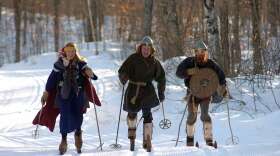The Public Broadcasting Act of 1967 paved the way for the creation of National Public Radio, which formally began on February 26, 1970.

NPR has come a long way since its earliest days, moving from a time when it was seen as alternative and experimental, to the point today where it boasts the most listened-to morning radio show in the United States.
Bill Siemering knows the early days well. The Wisconsin native was one of the guiding forces behind National Public Radio, serving on its founding board, and he later developing signature shows such as All Things Considered and Fresh Air.
He was first introduced to radio as a student at a two-room, country school, near Madison. Those early years as a student had a huge impact on how he continues to view radio and kinds of shows he created as an adult.
"Every time I turn on public radio, I learn something new and I always think of radio as a source of information."
Siemering says,"Every time I turn on public radio, I learn something new and I always think of radio as a source of information."
As one of the founding members of NPR board, Siemering crafted its original mission statement. He recalls he was sitting at his dining room table in Buffalo, New York.
"I wrote that because I was trying to make the transition from educational radio to public - and the words mean something. By 'public,' that means everybody... I was trying to differentiate it from commercial radio, from educational radio, from PBS - that was already on the air - and to capitalize on the unique strengths of radio as a medium, and to reflect the issues of the day," says Siemering.
"I was trying to make the transition from educational radio to public - and the words mean something. By 'public,' that means everybody."
Even in the 1960s, when Siemering first started working in radio, there were many who felt the days of the industry were numbered. Now, decades later, he believes the industry is experiencing a kind of Renaissance, in part thanks to podcasts.
"This is the age of audio... Radio is now elevated to a wonderful place," says Siemering.






